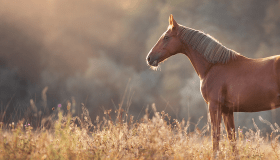
April 26, 2022 – For more than 70 years, Morris Animal Foundation has been a global leader in funding studies to advance animal health. With the help of generous donors like you, we are improving the health and well-being of dogs, cats, horses and wildlife around the world.
SAME DISEASE, DIFFERENT SIGNS
Although mitral valve disease is a common heart condition in small-breed dogs, researchers at North Carolina State University found differences when they compared two high-risk breeds. Mitral valve prolapse and fainting were more commonly seen in miniature schnauzers, while coughing and prior or concurrent cardiac medication use were more commonly seen in Yorkshire terriers – important information for veterinarians and breed owners. (Journal of the American Veterinary Medical Association, December 2021)
CANCER SURGERY
Optical coherence tomography (OCT) is successfully used in human cancer surgery to detect cancer cells left behind following tumor removal. The Ohio State University researchers used this technology to successfully assess surgical margins of injection-site sarcomas in cats – aggressive tumors located under the skin. The team developed a training program to teach professionals how to use OCT and increase the use of this real-time imaging assessment to improve outcomes for cats undergoing cancer surgery. (Veterinary and Comparative Oncology, August 2021)
REGENERATIVE THERAPY
Although stem-cell therapies to treat joint and soft tissue injuries in horses are popular, little is known about the efficacy of these treatments. Cornell University researchers noted the secretome (a set of proteins secreted by a cell) exhibits antimicrobial properties, both by killing bacteria and indirectly by stimulating the immune response of surrounding skin cells. Together, findings suggest stemcell secretome-based treatments may be helpful in treating infected wounds in horses. (Stem Cells Translational Medicine, December 2021)
CONTAGIOUS CANCERS
Tasmanian devils are fast disappearing due in part to two contagious facial cancers. University of Southampton researchers in the United Kingdom have been studying the two cancers, called devil facial tumor 1 and devil facial tumor 2. The team found that even though the two cancers have similar cellular origins, they are quite distinct from one another. This new information will inform vaccine design to help save these endangered marsupials from these devastating cancers. (PLOS Pathogens, November 2021)




